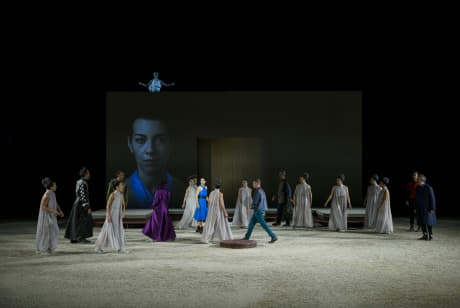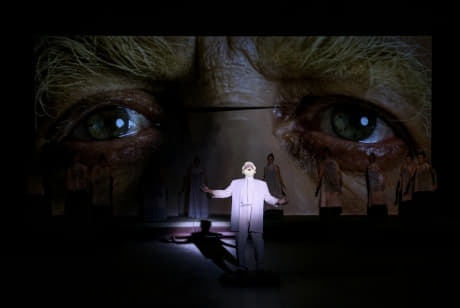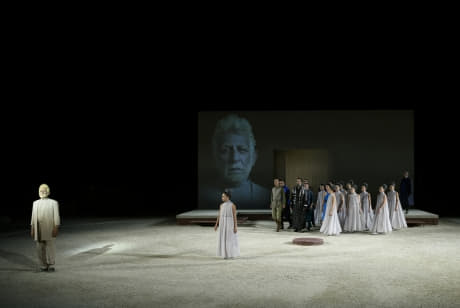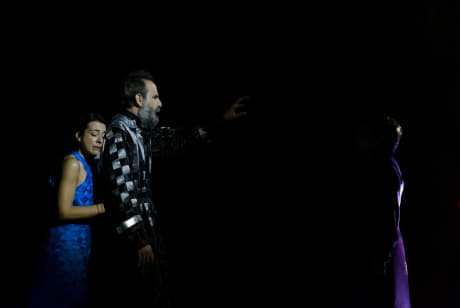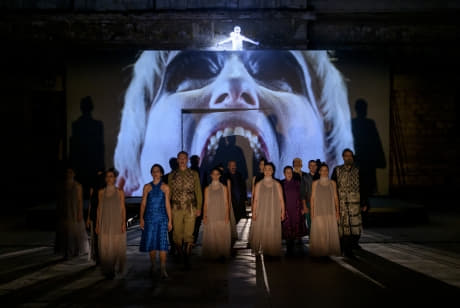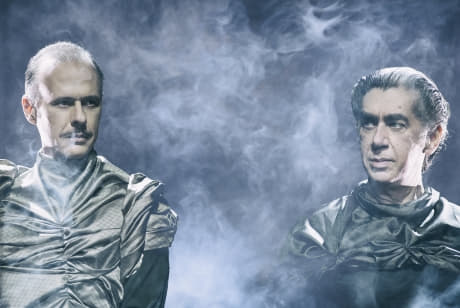Phoenissae was first staged at the City Dionysia festival between 411 and 408 BCE. It forms a trilogy with the tragedies Hypsipyle and Antiope. About fifty years after Aeschylus’ Seven Against Thebes, Euripides dramatises the myth of the Theban cycle, which relates to the tragic events of the House of the Labdacids and the struggle to rule Thebes, creating a multi-faceted family and political drama focussing on the values of justice, equality and fairness.
The exiled Polynices has led the allied Argive army to the gates of Thebes. In a desperate attempt to avert bloodshed, Jocasta begs her two sons to resolve their dispute peacefully.
Following the revelation by the seer Teiresias that the gods require the sacrifice of a young prince if Thebes is to be defended successfully, the pious Menoeceus, the son of Creon, is persuaded to give his life for the good of the city.
On the battlefield, the Thebans take command. Eteocles and Polynices decide to fight one another for the throne. Oedipus’ curse that his sons will kill one another comes true, each brother dying by the other’s hand. The sight of her dead sons drives Jocasta to take her own life.
Creon becomes the ruler of Thebes and Oedipus goes into exile.
In the twentieth century, Phoenissae was a constant in the National Theatre of Greece’s repertoire. It was last performed at the Athens and Epidaurus Festival by the NTG in 1988, having previously been staged in 1960, 1965 and 1978 (directed by Alexis Minotis on each occasion).
Director’s note
[...]
In my opinion, every production of a play from the past must adapt it to the present so that it can speak directly to a modern audience. That is why I have taken a number of liberties in the choral parts and the finale of the play, in an attempt to tie the Chorus more organically to the main action of the plot and give the ending a clearer resolution, while some cuts have been made to the text as well as a few transpositions of lines to improve its structure. Directorial choices also required some other changes: the prologue of the play is spoken by the Chorus, instead of Jocasta, while our production also includes the mute presence of the Sphinx, the mythological creature that is so often referred to in the text but does not appear on stage. While I hope that these dramaturgical and directorial interventions help illuminate the play, that is for its audiences to judge.
"Phoenissae", a tragedy of discord and civil strife, is timeless in its relevance. It presents a world that remains blind to history and refuses to learn from the past, continuing the destructive choices of division. This at a time when people all over the world are constantly dividing into warring camps, a trend that politicians of all shades have always rewarded, without any desire for true understanding and meaningful dialogue, calling on citizens to choose a camp, to decide between “them” and “us”. In "Phoenissae", Euripides holds up a mirror so that we can see ourselves and reflect on the responsibility of all of us for the perpetuation of this climate of division.
Giannis Moschos
Information
Summer Tour
- 30/07/2021 21:00Epidaurus Ancient TheatreBUY TICKETS
- 31/07/2021 21:00Epidaurus Ancient TheatreBUY TICKETS
- 01/08/2021 21:00Epidaurus Ancient TheatreBUY TICKETS
- 07/08/2021 21:00Ancient Theatre of PhilippiBUY TICKETS
- 27/08/2021 21:00katrakeio Theatro NikaiasBUY TICKETS
- 03/09/2021 21:00Theatro DasousBUY TICKETS
- 06/09/2021 21:00Theatre of Attiko Alsos
- 07/09/2021 21:00Theatre of Attiko Alsos
- 08/09/2021 21:00Theatre of Attiko Alsos
- 09/09/2021 21:00Theatre of Attiko Alsos
- 12/09/2021 21:00Old Oil Mill
- 15/09/2021 21:00Petras TheatreBUY TICKETS
- 23/09/2021 21:00SCHOOL OF ATHENS - Irene PapasBUY TICKETS
- 24/09/2021 21:00SCHOOL OF ATHENS - Irene PapasBUY TICKETS
- 25/09/2021 21:00SCHOOL OF ATHENS - Irene PapasBUY TICKETS
- 26/09/2021 21:00SCHOOL OF ATHENS - Irene PapasBUY TICKETS
With Greek and English surtitles
creation team
-
Nikiforos Papandreou
Translation -
Yannis Moschos
Direction, adaptation -
Tina Tzoka
Set design -
Ioanna Tsami
Costume design -
Thodoris Economou
Music -
Amalia Bennett
Choreography -
Antigoni Gyra
Associate choreographer -
Apostolis Koutsianikoulis
Video design -
Lefteris Pavlopoulos
Lighting design -
Eleni Papazoglou
Academic advisor -
Melina Peonidou
Music coach -
Evi Nakou
Directing assistant -
Elena Antonopoulou
Second directing assistant -
Eva Papadouraki
Set designer assitant -
Hronis tzimos
Hair design, Wigs -
Olga Faleichyk
Makeup design -
Vivi Spathoula
Production Dramaturg







